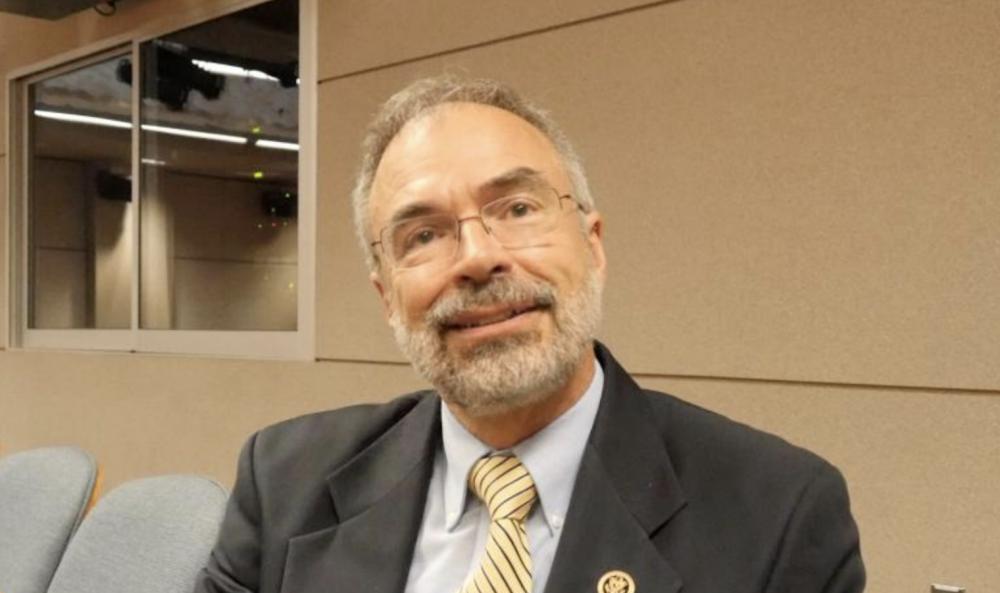My choice for the House of Representatives is Andy Harris. I interviewed both the Congressman and his opponent, Jesse Colvin, for the Spy and I encourage anyone reading this column to watch the interviews here and here.
I tried to approach the interviews with an open mind. Many of my Republican friends support Jesse, and I have immense respect for his service as an Army Ranger. The pages of the Star-Democrat and the Spy are full of complaints about Andy, though he has voted consistently in support of President Trump’s program.
The impressions I came away with were not what I expected. I have testified before Congressional Committees and worked with Members of Congress for over 40 years, and Andy Harris impressed me as one of the best-informed and articulate Members of Congress that I have ever met.
He addressed my questions thoroughly, stated his opinions clearly, and gave logical and factual explanations of his positions. We covered subjects from tax policy to the Chesapeake Bay, and I have rarely met a Congressman who was as well-informed about such a wide range of topics.
I discovered that I agree with his positions and votes on most issues, and that even on topics where we disagree, he had good and thoughtful reasons for his positions. Andy also rebutted quite thoroughly some of the complaints about his effectiveness in representing the Eastern Shore and false accusations that have been circulated.
Jesse Colvin is a bright and dedicated young man. I like him and I agree that we should elect many more veterans to positions in local, state, and national government. The number of veterans in Congress has declined from over 75% between 1971-1980 to under 20%. The effect of that decline on Congress’s maturity, competence and dedication to the good of the country is obvious.
My disappointment was that it was almost impossible to get a clear, specific answer to any question about his positions on major policy issues.
Jesse gave one of three responses to most of my questions: 1. I am supported by the With Honor PAC and will work with the other veterans now running for Congress to devise bipartisan solutions for the issues that now divide the country; 2. My service as an Army officer prepared me for dealing with critical issues and accomplishing difficult tasks or 3. I will look at the facts and make up my mind.
Those are all admirable intentions, but they do not reveal Jesse’s knowledge or position on issues. Andy’s answers made his knowledge and positions very clear. These are the specifics of Andy’s responses:
HealthCare: Andy voted for the bill to replace ObamaCare that passed the House. He discussed his support for the block grant approach to states to fund insurance for high risk patients and existing conditions, that the high premiums under Obamacare for healthy young people make them unwilling to buy any insurance, and that he believes that those recipients of Medicaid who are able should satisfy some kind of work requirement.
The economy: Andy said that he supported lowering taxes and easing regulatory burdens because he expected those two actions to reduce burdens on business, especially small business, increase income for wage-earners and stimulate employment and growth. He spent some time discussing how he expects tax cuts to stimulate the economy without serious harm to the deficit, and gave a very knowledgeable discussion of the arcane subject of how the CBO estimates revenues.
The environment: As a physician, Andy described how he looks at all the health implications of environmental policy, because the economic burden of environmental policies can have health effects that offset direct health benefits of the policies. He described his job as a Congressman as one of balancing the benefits and costs of environmental laws and regulations, to determine what is beneficial overall.
Debt ceiling and government shutdown: Asked about whether his votes against debt ceiling increases and emergency appropriations were obstructionism, Andy replied that he had voted for those measures under Speaker Boehner because they also contained spending cuts; he would not support them last year because they contained no spending discipline to offset the increased debt.
Gun control: The NRA gives Andy an A rating, and he advocates improving the background check system to ensure that relevant mental health information gets there. Andy also discussed his concerns, as a physician, about patient privacy and the potential abuse of Red Flag laws by those with a grudge against a gun-owner, tradeoffs that we must make as a society.
Representation of the Eastern Shore: Andy pointed out that his influence in Congress comes from his position on the House Appropriations Committee, and that he has used that influence to benefit this region by putting amendments into appropriations bills. This is what he did to restore the exemption from the H2b visa quota for returning workers that were needed by the seafood industry. He disagreed with the President about appropriating funds for Chesapeake Bay cleanup. When asked about his vote against the 2018 Farm Bill, Andy explained that most of the money in the bill is for the Food Stamp program, and that he favored deeper cuts in that program than were in the bill.
Travel to Czechoslovakia: When asked about accusations that he joined a Congressional delegation to meet with a far-right leader in Czechoslovakia, Andy replied, “It never happened.” He stated that the trip was cancelled, and he would not have participated in such a meeting in any event.
After discussing his service, I asked Jesse Colvin about defense and foreign policy, the state of the economy, gun control, abortion, and how he could vote against the Democrat leadership. His answers almost all sounded to me like rehearsed talking points, and were rarely responsive. To get a better fix on his positions, I have included some of the answers he gave to a Baltimore Sun interview.
Health care: Although we did not discuss it, in a Baltimore Sun interview Jesse advocated bundling Medicaid into Medicare and allow anyone to purchase insurance through Medicare.
Foreign policy: Jesse first discussed what a disaster war with North Korea would be, but he had no suggestions of what would be better than our current approach to dealing with that rogue regime.
Defense: Jesse mentioned that sometimes he had enough resources and sometimes he had too few to do his job as a soldier. He said that he did not equate patriotism with higher defense funding, because a great deal being funded today is not needed is. He looked forward to giving a soldier’s perspective.
Economy: Jesse talked about how economic conditions on the Eastern Shore are worse than in the rest of the economy. In a Baltimore Sun interview, he attacked President Trump’s tax cuts on the grounds that they helped the rich more than the poor.
Abortion: Jesse stated his support for a woman’s right to choose.
Gun Control: In his Baltimore Sun interview, Jesse supported bans on bump stocks, better information sharing, universal background checks, and Red Flag laws. He and I discussed how he would apply his expert knowledge of firearms to correct the misinformation most politicians rely on.
Independence of the leadership: When asked about how a first term congressman from a contested district could stand up to pressure from Nancy Pelosi, Jesse did not answer directly. Instead, he said that he would like to see new leadership in Congress. He did not see himself standing alone, because he expected there to be a group of veterans elected to the next Congress who would stand together for bipartisan, centrist solutions.
The best part of my talk with Jesse was when he mentioned the need for veterans in Congress and I replied with a quote from Robert Heinlein’s Starship Troopers. That led us to talk about decay in the moral character of Jesse’s contemporaries who did not serve and the desirability of compulsory national service. I will write in another column about this topic, on which I agree with him completely.
In reviewing these two debates, it was clear to me that Andy Harris voted my way on almost every issue and delivered effectively for his constituents. I did not agree with Jesse Colvin’s positions on the key economic issues of health care and tax policy that he stated to the Baltimore Sun, and I could not find enough specifics in Jesse Colvin’s responses in most other areas to tell how he would vote. I was disappointed that he brought up the false accusation about a nonexistent trip to the Czech Republic.
Two additional points were critical to my conclusion that I could not vote for Jesse. For one, Colvin passed the Democratic litmus test by stating his unambiguous opposition to restrictions on abortion. That by itself would make it impossible for me as a Catholic to vote for him instead of Andy Harris, who would at minimum restrict abortions after the first trimester and clearly respects life from conception to natural death.
My support for Harris does not depend on that issue along. Even if Jesse and Andy had identical positions on abortion, Harris would be my choice. Being a veteran is not sufficient by itself to make someone the best candidate. I am voting for someone to represent me, and that makes me want to select the candidate whose votes will be most consistent with my preferences for public policy.
I do not believe Jesse Colvin would be able to vote in that way, even if his policy priorities agreed with mine. It is naïve for him to think that a group of veterans who have been supported by the With Honor PAC will be able to change or defy a Democrat leader who controls campaign funding and committee assignments. Even if they are united, this group will have a small fraction of the votes needed to pass legislation and few resources of their own until they advance considerably in seniority. And to be re-elected and gain influence, they must cultivate the goodwill of the leadership. The idea that the leadership will give them, or tolerate them taking, the role of centrist dealmakers ignores how Congress works.
Certainly, the leadership would understand the nature of his district and let a Rep. Colvin vote his conscience if there were a large margin for or against a bill. But it strains credibility to believe that on an issue where his vote would make a difference, a freshman Congressman could withstand the pressure to vote the party line or give up any hope of decent committee assignments or campaign funding.
I urge every Republican and Independent who is considering voting for Colvin to consider the implications of a Democratic majority in the House of Representatives.
Vote for Colvin if you support the actions of the Democratic leadership in Congress. But do not vote for Colvin in the hope that he will be able to vote independently of Nancy Pelosi when it matters or because you hate Donald Trump.
It will not be Jesse Colvin’s fault, but if the current Democratic leadership takes over, it will mean two more years of encouragement of mob rule, threats of impeachment, and escalated attacks on the President, his nominees, and members of Congress who support them. He just might be the swing vote that keeps that leadership in place.
I am confident that judges appointed by President Trump will protect our freedom of religion and expression and the Constitution, and we need more like them. I am convinced that his tax and regulatory policies strengthen our economy and that his actions to increase defense spending and in foreign policy make us more secure. If you agree with me, remember that it requires a Republican majority in both Houses of Congress to keep on that course.
David Montgomery is retired from a career of teaching, government service and consulting, during which he became internationally recognized as an expert on energy, environmental and climate policy. He has a PhD in economics from Harvard University and also studied economics at Cambridge University and theology at the Catholic University of America, David and his wife Esther live in St Michaels, and he now spends his time in front of the computer writing about economic, political and religious topics and the rest of the day outdoors engaged in politically incorrect activities.






 Throughout our visit, we were continually impressed and touched by how France has honored the men who died. Normandy itself paid a high price for the liberation of Europe, with two-thirds as many civilians killed as Allied soldiers and airmen. Almost no buildings built before 1944 were standing in the cities of Normandy that we visited. Caen, Saint Lo, Le Havre and other cities were leveled by Allied bombers in the weeks prior to D-Day, to slow German reinforcements and supplies from reaching Normandy, and what remained was destroyed in the protracted battles to drive out the Germans. Showing their solidarity in suffering, the Normans erected a memorial to those who died on 9-11 at a 12
Throughout our visit, we were continually impressed and touched by how France has honored the men who died. Normandy itself paid a high price for the liberation of Europe, with two-thirds as many civilians killed as Allied soldiers and airmen. Almost no buildings built before 1944 were standing in the cities of Normandy that we visited. Caen, Saint Lo, Le Havre and other cities were leveled by Allied bombers in the weeks prior to D-Day, to slow German reinforcements and supplies from reaching Normandy, and what remained was destroyed in the protracted battles to drive out the Germans. Showing their solidarity in suffering, the Normans erected a memorial to those who died on 9-11 at a 12